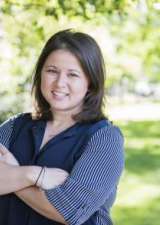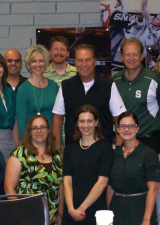Couple and Family Therapy Graduate Program Overview
The PhD specialization trains scientist-practitioners and is accredited by the Commission on Marriage and Family Therapy Education. Current accreditation continues through November 1, 2019.
The CFT (formerly MFT) program is committed to training excellent therapists who are also excellent researchers and trainers of therapists. We expect each student to develop an approach to therapy that is personally consistent and grounded in sound theory and practice. In a context that emphasizes tolerance and self-examination, students are encouraged to pursue a program of research that is personally and professionally relevant and important. For us, graduate education is a time of apprenticeship—intensive learning from faculty and other students about research, therapy, and ourselves.
CFT faculty come from diverse backgrounds, training programs, and theoretical orientations. However, we share a common interest in consistently supporting and challenging the development of competent scientist-practitioners who understand the importance of a holistic perspective—i.e., an ecological perspective that takes into account the client couple, family, or individual in the context of their own history and experiences in their lives, their present context, and the context of their homes, neighborhoods, cities, and wider society. For more information, visit: Mission Statement and Statement of Expected Outcomes
Admission
Students are admitted to the doctoral specialization in Couple and Family Therapy in the Department of Human Development and Family Studies. Students who enter with a master’s degree from an accredited CFT/MFT program, or its equivalent, will enter the doctoral program directly. MSU no longer offers a MA in CFT.
Applicants who currently have masters degree in areas other than CFT/MFT will be considered, however they will be will be required to complete courses that are equivalent to a masters degree in CFT/MFT. These courses will be determined after a review of previous master’s coursework by the CFT program director. Generally, it is possible to accept clinical experiences and courses from the student’s master’s degree as part of the equivalency. Students in such cases should anticipate that their education will be longer than those entering with a master’s degree in CFT/MFT.
Time Frame
Students entering the Ph.D. program with a master’s degree in MFT are expected to finish in 4 years or less. Depending on prior coursework and appropriate clinical experiences, students entering with a master’s in another area may require 1-2 additional years to complete the PhD. A total of 1,000 hours of direct client contact is required for the doctoral degree in CFT. A 9-month internship is also required that may include clinical, teaching, administrative and research experiences.
Clinical Training
The first phase of clinical training takes place in the Couple and Family Therapy Clinic. The Clinic is located in the MSU Clinical Center, and housed with the clinics of the MSU Schools of Human Medicine and Osteopathy. The Clinic functions as a non-profit community-based agency.
Clients come from the area in and around Lansing (population, 450,000), as well as from the MSU community (47,000 students, 11,000 faculty and staff). Services are provided on a sliding fee scale and supervision is provided by CFT faculty and associate faculty. Senior doctoral students provide additional mentoring for first year students. Each session is recorded on DVDs for review and supervision. After the first year, students continue providing services in the Clinic, as well as seeking experiences in the community.
Research Training
The CFT doctoral program is committed to providing research experiences for each student that lead toward publications and conference presentations. We encourage students to go beyond the required courses to identify courses in the Department of Human Development and Family Studies (HDFS), Psychology, Social Work, and Sociology that will strengthen their research efforts. We want each student to combine classroom learning with continuous hands-on experience in research and publication. The Department provides computers, statistical programs, coding programs, and a video coding laboratory for student-faculty research, as well as dedicated family research space. The Clinic provides opportunities for observation, data collection, coding, etc. The University provides a research design and data analysis consultation service open to students and faculty.
As the field of CFT/MFT grows and develops, there is an increasing need for doctoral graduates who are committed to and can carry out sophisticated programs of research, regardless of their setting—academic, medical, agency, advocacy, or private practice. Our goal is to provide the kinds of experience that will set the stage for such efforts.




